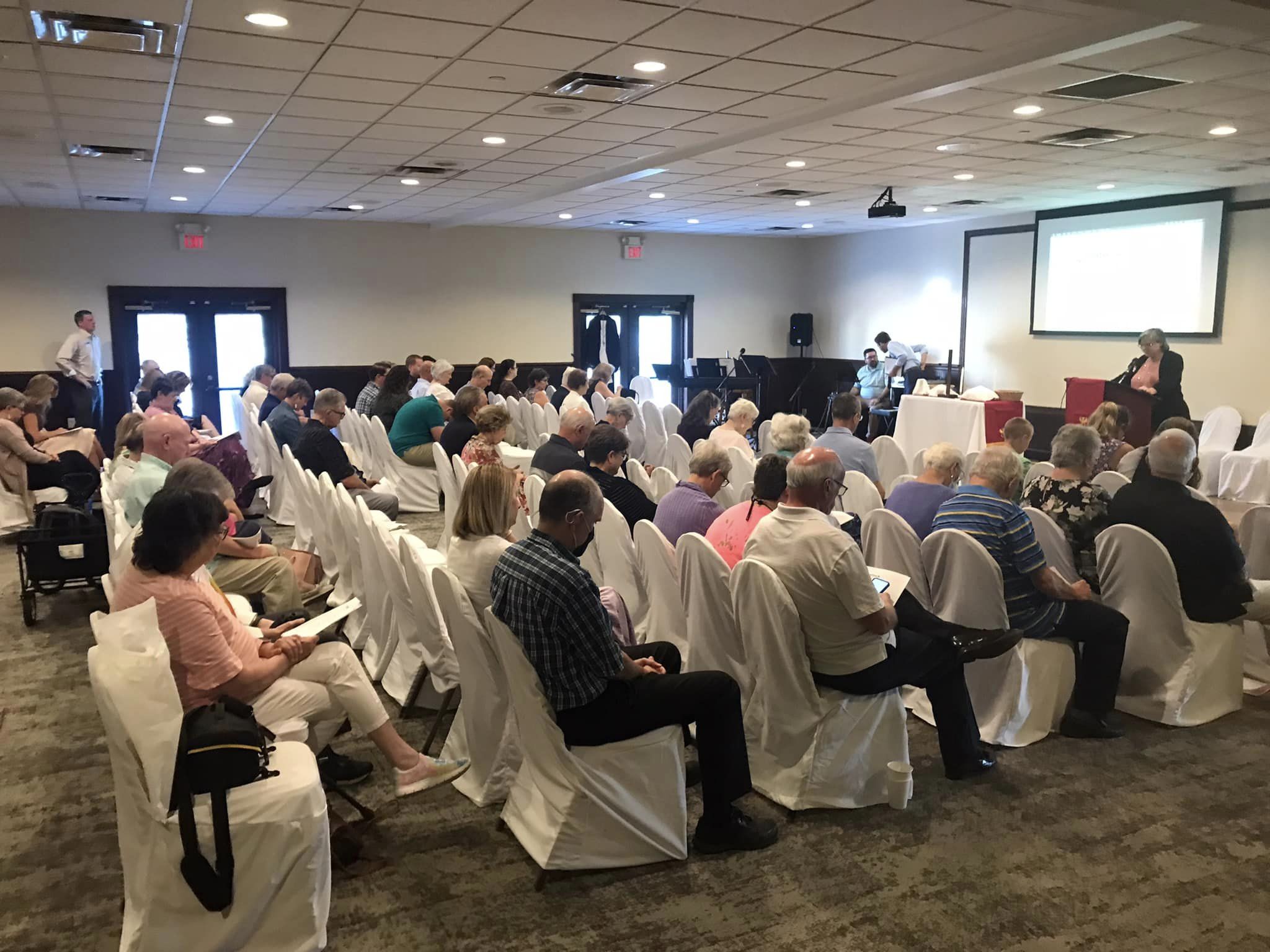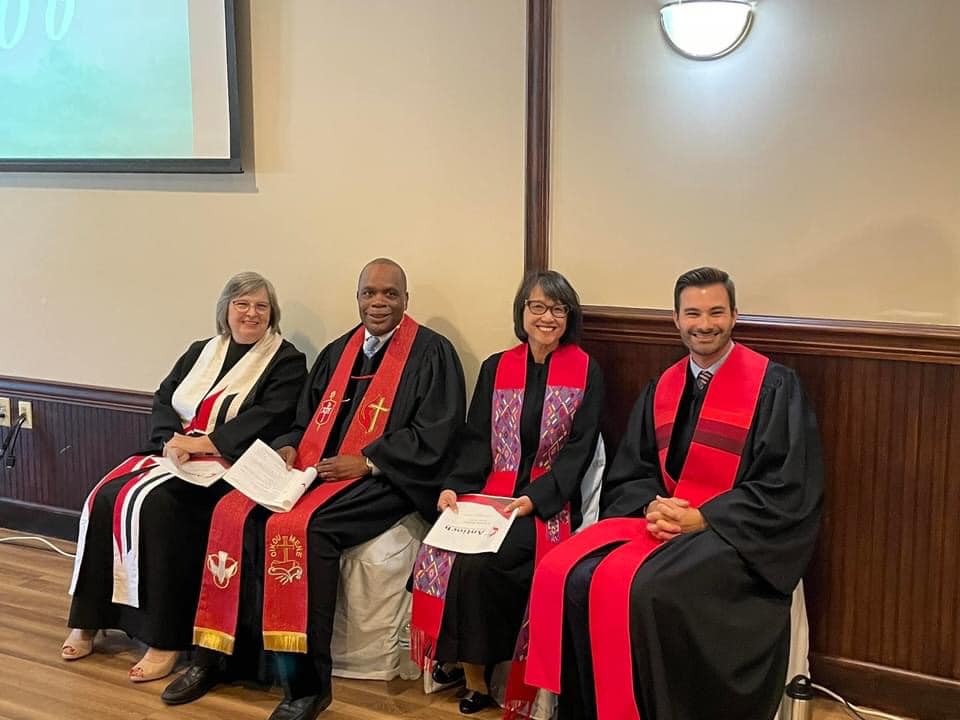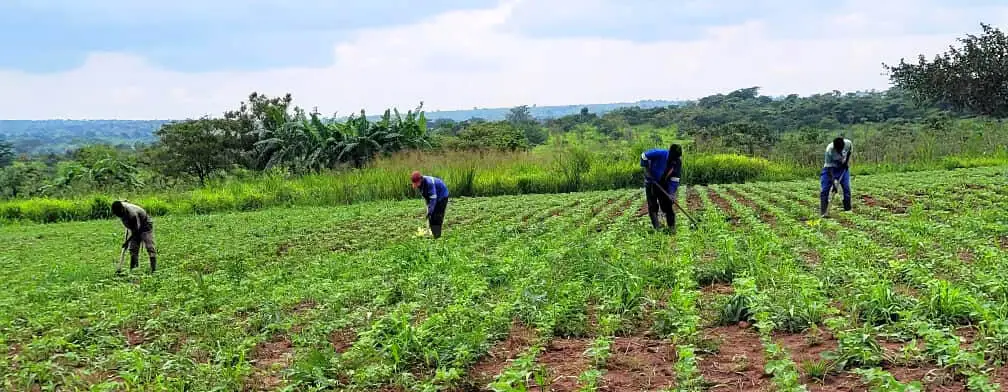
About Us
Our Story
We began as a gathering of United Methodists in April 2023. Faced with losing our church homes due to denominational conflicts, we began worshipping together, committed to the future of United Methodist ministry in our area. We quickly organized and were chartered as Antioch United Methodist Church on Sunday, August 20, 2023.
From the beginning, our focus has been on what the Holy Spirit has in store for the future, not on the circumstances we faced in the past. As United Methodists, we know God often calls his people into new expressions of faith and church, and we believe this is what he has called Antioch United Methodist Church to be.

Our Core Values
We have HOPE in God’s redemption
Our first value is all about God’s work in the world that is already happening and not yet complete. In the communion liturgy, we say “Christ has died, Christ is risen, Christ will come again.” Like Christ’s resurrection following his death, God redeems. He takes what is painful and what is broken, and he makes celebration and wholeness. He has made eternal life possible for us all, and the resurrection of Jesus Christ was merely the first expression of the resurrection that is to come. There is a day to come when we will not escape this world but Christ will return to this world, reunite heaven and earth, and redeem all things as the Kingdom of God. We have this hope!
Scriptures for reference:
We seek HARMONY through Jesus Christ
Our belief in the harmony made possible through Jesus Christ is rooted in the nature of God. As the Trinity, our God’s nature is harmonious, and Christ prayed that his followers would be one with each other and one in him just as the Father, Son, and Holy Spirit are one. Despite all the challenges to this harmony in a world so committed to conflict, it is one of our core commitments.
We intend to never divide ourselves because of our generations, stylistic preferences, or even disagreements over theological nonessentials. We accept this is challenging work, and we are committed to it.
Scriptures for reference:
We live in the LOVE of the Holy Spirit.
In many ways, this value is the summation of all we believe and all we practice. Our hope for what is to come inspires us to live in love today. Our commitment to being in harmony with one another empowers our ability to live in love for all people. Everything we believe is practiced in the love of the Holy Spirit.
The Holy Spirit is actively at work in every person’s life, confirming God’s love for them. From the moment you were created, God has loved you, and his Spirit has been with you. In God’s love, you should experience no fear. In God’s love, you are secure. In God’s love, you may grow to be the person you were created to be.
All teaching, knowledge, and law, is summed up in the two commands we have been given: love the Lord with all our heart, soul, mind, and strength, and love your neighbor as yourself. With the Holy Spirit working in and through us, we are committed to living in the love of God.
Scriptures for reference:

The Beliefs and Practices of United Methodists
The Book of Discipline
As a congregation of the United Methodist Church, our beliefs and governance are stated in the The Book of Discipline of the United Methodist Church. UMC.org describes The Discipline as, “A fundamental book outlining the law, doctrine, administration, organizational work and procedures of The United Methodist Church. Each General Conference amends The Book of Discipline, and the actions of the General Conference are reflected in the quadrennial revision.”
Due to the disruption of the COVID pandemic, we continue to function under the text of the 2016 Discipline. In 2024, the next General Conference will meet and revisions will be considered.
The Book of Discipline, like all healthy governing documents, is the subject of constant conversation and faces regular revisions and refinement. At every General Conference, we accept changes we approve of may or not be passed and changes we disapprove of may or may not be passed. We are grateful that every United Methodist is able to participate in the conversations of our denomination.
Some parts of The Book of Discipline cannot be changed only by General Conference action. Paragraphs protected by the “Restrictive Rules,” require a 3/4 majority from every Annual Conference around the world to change. These protected sections of The Discipline include our Articles of Religion and Confessions of Faith, our episcopal governance structure, and the General Rules. Read the restrictive rules in full here.
Articles of Religion and Confession of Faith
The United Methodist Church was formed in 1968 by a merger of two previously separate denominations: the Methodist Episcopal Church and the Evangelical United Brethren Church. Since the beginning of the church, the doctrinal statements of both churches have been preserved as the doctrinal statements of the new unified church and can be found in ¶104 of The Book of Discipline.
In these doctrinal statements, you will see our strong affirmations of the foundational doctrines of Christianity: the Trinity, the nature of Christ, the resurrection, Scripture, and many more.
Wesleyan Tradition
Along with the statements of faith mentioned above, Part III of The Book of Discipline includes additional sections that together form our “Doctrinal Standards and Theological Task.” Included in them is a description of our Wesleyan heritage and doctrinal distinctives. The United Methodist Church is one of many denominations whose doctrinal heritage dates back to the ministry and teachings of John Wesley. According to The Book of Discipline:
“The thrust of the Wesleyan movement and of the United Brethren and Evangelical Association was ‘to reform the nation, particularly the Church, and to spread scriptural holiness over the land.’...
“The Wesleyan emphasis upon the Christian life - faith and love put into practice - has been the hallmark of those traditions now incorporated into The United Methodist Church. The distinctive shape of the Wesleyan theological heritage can be seen in a constellation of doctrinal emphases that display the creating, redeeming, and sanctifying activity of God.”
To read about our heritage and these emphases in full, you can find then in ¶102-3 of The Book of Discipline. The entire Discipline is available online for free here.
The General Rules
An essential part of our Wesleyan heritage is the General Rules, which are included in the protected ¶104 of The Book of Discipline. These rules were developed by John Wesley through his work with the earliest Methodist societies. Methodists of the early societies were expected to give an account of their observance of these rules. While the structure of today’s Methodist life may look different, we hold these three general rules as essential guides to the pursuit by Methodists of the form and power of holiness. The rules in summary are:
1. Do no harm.
2. Do good.
3. Attend upon the ordinances of God.
Theological Task
The final section of The Book of Discipline Part III is found in ¶105 - Our Theological Task. While we have established and protected doctrines and practices that you see above, we also acknowledge the importance of effectively applying our doctrinal standards to the current theological conversations of the day. The Theological Task “assists us in the discernment of Christian truth in ever-changing contexts.” Our Theological Task outlines the sources and criteria used for this process of discernment. They are Scripture, tradition, reason, and experience. Of these, Scripture is primary, and it serves as the focus of our study and discernment. Read more about Our Theological Task, including The Discipline’s commentary on each of these four sources in full, here.
Social Principles
In addition to the constitutionally protected elements of our doctrine and history, the United Methodist Church also has a collection of Social Principles that, “while not to be considered church law, are a prayerful and thoughtful effort on the part of the General Conference to speak to the human issues in the contemporary world from a sound biblical and theological foundation as historically demonstrated in United Methodist traditions.” (2016 Book of Discipline, p105)
¶160-166 of The Book of Discipline contain our Social Principles on The Natural World, the Nurturing Community, the Social Community, the Economic Community, the Political Community, the World Community, and Our Social Creed. These principles are often revised at the regular General Conference meetings every four years. In 2024, the General Conference will consider a comprehensive update to the Social Principles.







